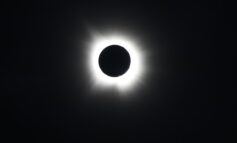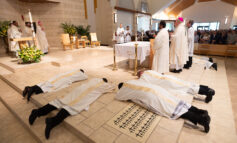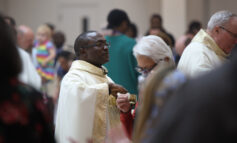By Father John Bayer
Special to The Texas Catholic
Recently, I accompanied some really awesome students to John Bunker Sands Wetlands Center, which is a beautiful water treatment facility and nature preserve southeast of Dallas. We listened to interesting presentations from the naturalists who care for the site, and then we tested the water quality. One of the tests was for turbidity, or the cloudiness of the water caused by tiny particles. The instrument used for this test is a long tube, at the base of which is what the naturalist called a “Secchi symbol.”
After the naturalist introduced the instrument, I asked whether the symbol was named after Angelo Secchi, the nineteenth-century Italian scientist. She said she thought that is correct. I might not have gauged her response well, but I think the naturalist was pretty surprised when I then said that Secchi was also a Jesuit priest. In any case, I chuckled to myself as we tested the water because I enjoyed finding signs of the Catholic Church in places where many people least expect it – at the heart of a science experiment.
Why do people not expect to see the Catholic Church involved in the history of science? That is a complicated question, but one factor, I think, is the fact that we do not think about science as a human phenomenon. That is, its methods and practitioners are often assumed to exist in a kind of celestial “objectivity” disconnected from the life of scientists and the “subjective” elements of their culture like art, philosophy and theology. But the truth is, as most historians of science know, that our greatest scientific discoveries are often manifestly nurtured by the beliefs, aesthetic sense and imagination of our scientists. Is it any wonder, for example, that the theory of evolution – or the emergence of species as an effect of time and accident – was first articulated in the nineteenth century, or in a culture so deeply marked by “historicist” thinking? Similarly, is it really a surprise that the author of the Big Bang Theory – or the idea that the universe is not in a “steady state” of eternal and inevitable existence, but rather a totality unfolding from a “beginning” – was authored by a Catholic priest, Fr. George Lemaitre, who every Easter Vigil heard the first reading proclaim, “In the beginning…” (Gen 1:1).
There are other reasons, I think, why people do not expect the Catholic Church to become involved in science. For example, historians of science, for whatever motive, sometimes seem shy about telling this part of their story. Recently, I accompanied these students again, but this time to the Perot Museum, which is a great place to learn about science. I was amazed at how informative and engaging this museum is for visitors of all ages. But if I am honest, I was disappointed by how they narrated the history of astronomy. In a series of beautifully illustrated panels, the curators move from the ancient Greeks to the Arabs and then to Copernicus, thereby skipping entirely the medieval Christian Latin and Greek traditions. Not a word about where astronomy survived in the West for a thousand years, when classical civilization collapsed at the fall of the Roman Empire, nor a word about the tradition that took the Arabic sources to translate and develop them before Copernicus.
As the panels tell the history of astrophysics, they mention German and American scientists but say nothing about the actual pioneer – again our Italian Jesuit Angelo Secchi. Secchi was the first to classify stars systematically according to their light spectra, and he paved the way for later scientists leading many historians to refer to him simply as the “father” of astrophysics. Finally, to my great surprise, the panels ascribed the Big Bang Theory to George Gamow and Ralph Alpher, instead of to its original author, Fr. George Lemaitre. Again, I don’t know why, but it seems clear that some historians overlook even the most obvious traces of the Catholic Church in their versions of the history of science.
In the end, it falls to Catholics to know their story and to tell it. If you like science, learn its history! Who were Pope Sylvester, Robert Grosseteste, Nicholas Oresme, Christopher Clavius, Giuseppe Moscati, Jerome Lejeune and so many others? You now know who put the “Secchi” in the Secchi Symbol, but who put the “Mendel” in Mendelian Genetics, or the “Steno” in Steno’s Laws of Stratigraphy? For lack of space I have to let you look them up, but I will say that two of these – Moscati and Steno – are even canonized!
Father John Bayer, O.Cist., is a theologian and monk at the Cistercian Abbey of Our Lady of Dallas in Irving.



